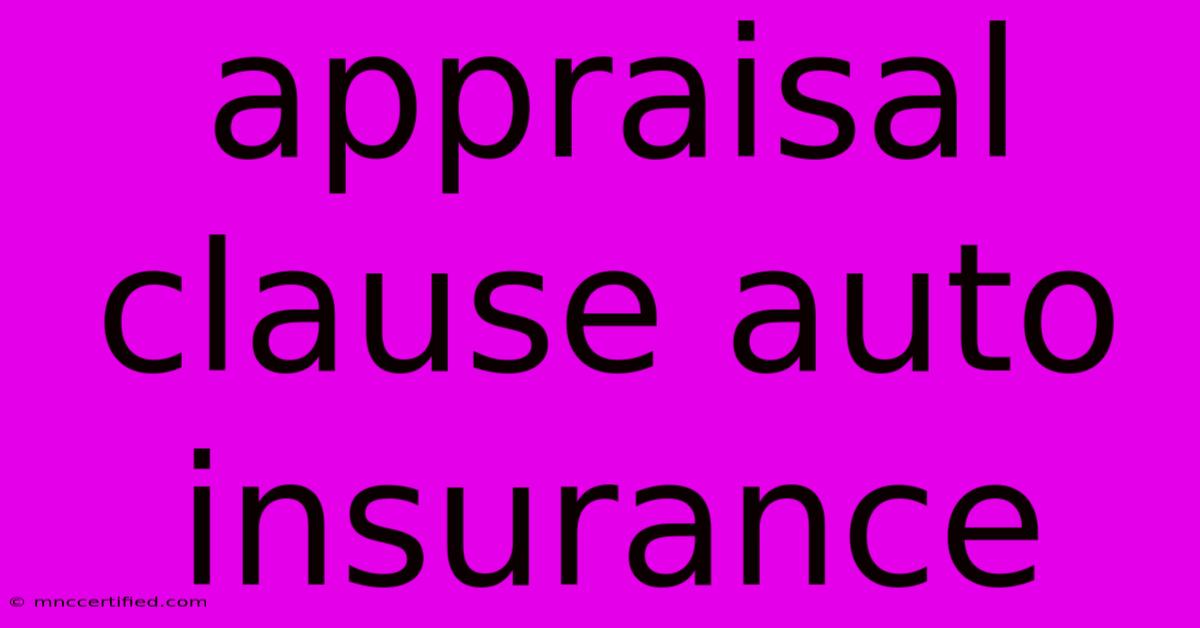Appraisal Clause Auto Insurance

Table of Contents
Understanding Your Appraisal Clause in Auto Insurance: A Comprehensive Guide
Auto accidents are stressful enough without navigating the complexities of insurance claims. One crucial aspect often overlooked is the appraisal clause in your auto insurance policy. This clause provides a crucial mechanism for resolving disagreements about the value of your damaged vehicle, ensuring a fair settlement. This article will break down everything you need to know about appraisal clauses, empowering you to protect your rights and receive the compensation you deserve.
What is an Appraisal Clause in Auto Insurance?
An appraisal clause is a provision within your auto insurance policy that outlines a process for resolving disputes regarding the amount your insurer offers for vehicle repairs or a total loss claim. Essentially, it's a method for independent valuation when you and your insurance company can't agree on the fair market value of your damaged car. This is particularly relevant in cases of significant damage or total loss, where the repair costs or vehicle replacement value are substantial.
Key takeaway: The appraisal clause helps avoid drawn-out legal battles and provides a faster, more efficient way to determine a fair settlement.
When Does the Appraisal Clause Come into Play?
The appraisal clause typically kicks in after you've filed a claim and your insurance company has provided a payout offer. If you believe the offered amount is too low and doesn't accurately reflect the actual cost of repairs or the vehicle's fair market value, you can invoke the appraisal clause. This typically happens when:
- Disagreement on repair costs: The insurer's estimate for repairs is significantly lower than what independent shops quote.
- Total loss disagreement: You disagree with the insurer's assessment of your vehicle's actual cash value (ACV) following a total loss.
- Disagreement on Diminished Value: You believe your vehicle has lost value due to the accident, even after repairs. Note that Diminished Value isn't always covered, so check your policy carefully.
Important Note: The appraisal process is typically only for determining the value of the vehicle, not for liability determination.
How Does the Appraisal Process Work?
The appraisal process usually involves these steps:
- Formal Notification: You formally notify your insurance company of your intent to utilize the appraisal clause. This usually involves sending a written notice.
- Each Party Selects an Appraiser: Both you and the insurance company each choose a qualified, independent appraiser. These appraisers are typically experienced in vehicle valuations.
- Appraisers Choose an Umpire: The two appraisers select a neutral umpire to resolve any disagreements between them.
- Appraisal Conducted: The appraisers inspect the vehicle and provide their independent valuations. If they disagree, the umpire makes the final determination.
- Binding Decision: The decision reached by the majority (two out of three) is generally binding on both you and the insurance company.
Pro-Tip: Thoroughly document all communication with your insurance company, including photos and repair estimates. This evidence is invaluable during the appraisal process.
Choosing Your Appraiser: Making an Informed Decision
Selecting a competent appraiser is crucial for a fair outcome. Consider these factors:
- Experience: Look for an appraiser with extensive experience in vehicle valuations and a strong reputation.
- Independence: Ensure the appraiser is truly independent and not affiliated with either your insurance company or any repair shops.
- Qualifications: Check their qualifications and certifications to ensure they have the necessary expertise.
- References: Request references and check reviews to gauge their professionalism and reliability.
Optimizing Your Chances of a Favorable Outcome
To maximize your chances of a favorable outcome using the appraisal clause, follow these steps:
- Gather Evidence: Compile a comprehensive file of supporting documents, including repair estimates, photos of the damage, vehicle history reports, and market values for comparable vehicles.
- Thorough Communication: Maintain clear and concise communication throughout the entire process. Document all interactions.
- Seek Professional Advice: Consider consulting with an attorney specializing in insurance claims if you face significant challenges or uncertainty.
Appraisal Clause: Your Right to Fair Compensation
The appraisal clause is a valuable tool that protects your rights as a policyholder. Understanding how it works and preparing thoroughly can significantly improve your chances of receiving a fair settlement after an auto accident. Don't hesitate to utilize this clause if you believe your insurance company's offer undervalues your vehicle's damage or loss. Remember, it's your right to seek fair compensation.
Keywords: Appraisal Clause, Auto Insurance, Car Insurance, Appraisal Process, Vehicle Valuation, Total Loss Claim, Repair Costs, Diminished Value, Actual Cash Value (ACV), Insurance Claim, Fair Market Value, Independent Appraiser, Umpire, Insurance Dispute Resolution.

Thank you for visiting our website wich cover about Appraisal Clause Auto Insurance. We hope the information provided has been useful to you. Feel free to contact us if you have any questions or need further assistance. See you next time and dont miss to bookmark.
Featured Posts
-
Chester A First Look Preview
Nov 23, 2024
-
Grinch Happy Meal A Us Miss
Nov 23, 2024
-
Lord Abbett Municipal Bond Fund
Nov 23, 2024
-
Overfunded Whole Life Insurance
Nov 23, 2024
-
Bogdanovich Chers Asshole Comment On Mask
Nov 23, 2024